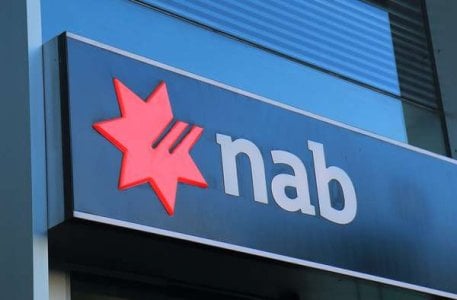Major bank embraces future with significant online banking shift amidst digital boom
- Replies 15
In a move that signals the end of an era, the National Australia Bank (NAB) has announced a significant shift in how customers will access their online banking services.
As we continue to ride the wave of the digital boom, NAB is setting the stage for a future where traditional passwords will become a thing of the past.
This change is not just a nod to convenience but a response to the growing need for enhanced security in our increasingly online lives.
NAB's digital subsidiary, ubank, has already taken the leap by allowing customers to unlock their accounts with a passkey.
The bank plans to follow suit, with the expectation that its online banking system will operate similarly within the next few years.
This transition is a testament to the bank's commitment to staying at the forefront of digital innovation, ensuring that its customers benefit from the latest advancements in cybersecurity.

NAB's Chief Security Officer, Sandro Bucchianeri, has emphasised the delicate balance between security and usability.
The challenge lies in creating a system that is robust enough to deter cyber threats without being so complex that it drives users to seek out less secure, more convenient alternatives.
Traditional passwords, while familiar, are often too simple and vulnerable to attacks. They must be easy enough to remember, which, unfortunately, also makes it easier for hackers to guess or obtain them through various means.
The solution? Passcodes that utilise biometric data, such as fingerprints and facial recognition, or secure codes sent to customers' phones.
These methods are not only more secure but also more user-friendly.
To use this technology, customers will need a device that supports and is upgraded to iOS 16 or later, or Android 9 or later, and a device that has either a PIN or FaceID screen lock.
The passkeys are then generated within the phone settings, adding an extra layer of security.
‘As Australia’s largest business bank, we recognise and understand the important role we can play—alongside government and industry—in the fight against malicious cyber activity,’ Mr Bucchianeri stated.
‘When it comes to cybersecurity and the use of passwords, vigilance is key.’
‘Trying to strike the right balance between security and usability is something we’re constantly striving to achieve, but we will always put the security of our customers and the bank first,’ he added.
This announcement comes on the heels of the Reserve Bank of Australia's (RBA) revelation of digital payment data, which highlights the staggering growth of digital banking.
In October alone, over 500 million payments were made using mobile wallets, totalling more than $20 billion.
Australian Banking Association (ABA) CEO Anna Bligh has declared that ‘Australia is well and truly in a digital banking boom.’
‘Go back a decade, and almost no one was making a digital wallet payment. Now we’re seeing over half a billion payments being made with mobile wallets in just one month,’ she pointed out.
‘With the ongoing surge in digital payments, it’s critical these transactions are subject to the same oversight and consumer protection laws as the rest of the payments system.’
‘That’s why the ABA supports legislation currently in the Parliament that will ensure Australia’s payments regulatory framework remains fit-for-purpose and covers new entrants into the market,’ Ms Bligh continued.
In an era where digital transformations are reshaping the banking landscape, NAB's recent announcement to scrap passwords in favour of biometric authentication underscores its commitment to embracing innovative solutions for enhanced online security.
This digital shift aligns seamlessly with NAB's efforts to cater to customer needs, as evidenced by its decision to extend opening hours to include Saturdays for 12 of its branches.
By expanding branch accessibility and implementing advanced digital features, NAB is demonstrating a proactive approach to providing comprehensive and convenient banking experiences for its customers.
 We'd love to hear your thoughts on this transition. Are you ready to say goodbye to passwords? Do you feel confident about using biometric data to access your bank accounts? Share your experiences and opinions in the comments below, and let's navigate this digital transformation together.
We'd love to hear your thoughts on this transition. Are you ready to say goodbye to passwords? Do you feel confident about using biometric data to access your bank accounts? Share your experiences and opinions in the comments below, and let's navigate this digital transformation together.
As we continue to ride the wave of the digital boom, NAB is setting the stage for a future where traditional passwords will become a thing of the past.
This change is not just a nod to convenience but a response to the growing need for enhanced security in our increasingly online lives.
NAB's digital subsidiary, ubank, has already taken the leap by allowing customers to unlock their accounts with a passkey.
The bank plans to follow suit, with the expectation that its online banking system will operate similarly within the next few years.
This transition is a testament to the bank's commitment to staying at the forefront of digital innovation, ensuring that its customers benefit from the latest advancements in cybersecurity.

NAB plans to scrap traditional passwords in a major online banking overhaul amidst the digital shift. Credit: Shutterstock
NAB's Chief Security Officer, Sandro Bucchianeri, has emphasised the delicate balance between security and usability.
The challenge lies in creating a system that is robust enough to deter cyber threats without being so complex that it drives users to seek out less secure, more convenient alternatives.
Traditional passwords, while familiar, are often too simple and vulnerable to attacks. They must be easy enough to remember, which, unfortunately, also makes it easier for hackers to guess or obtain them through various means.
The solution? Passcodes that utilise biometric data, such as fingerprints and facial recognition, or secure codes sent to customers' phones.
These methods are not only more secure but also more user-friendly.
To use this technology, customers will need a device that supports and is upgraded to iOS 16 or later, or Android 9 or later, and a device that has either a PIN or FaceID screen lock.
The passkeys are then generated within the phone settings, adding an extra layer of security.
‘As Australia’s largest business bank, we recognise and understand the important role we can play—alongside government and industry—in the fight against malicious cyber activity,’ Mr Bucchianeri stated.
‘When it comes to cybersecurity and the use of passwords, vigilance is key.’
‘Trying to strike the right balance between security and usability is something we’re constantly striving to achieve, but we will always put the security of our customers and the bank first,’ he added.
This announcement comes on the heels of the Reserve Bank of Australia's (RBA) revelation of digital payment data, which highlights the staggering growth of digital banking.
In October alone, over 500 million payments were made using mobile wallets, totalling more than $20 billion.
Australian Banking Association (ABA) CEO Anna Bligh has declared that ‘Australia is well and truly in a digital banking boom.’
‘Go back a decade, and almost no one was making a digital wallet payment. Now we’re seeing over half a billion payments being made with mobile wallets in just one month,’ she pointed out.
‘With the ongoing surge in digital payments, it’s critical these transactions are subject to the same oversight and consumer protection laws as the rest of the payments system.’
‘That’s why the ABA supports legislation currently in the Parliament that will ensure Australia’s payments regulatory framework remains fit-for-purpose and covers new entrants into the market,’ Ms Bligh continued.
In an era where digital transformations are reshaping the banking landscape, NAB's recent announcement to scrap passwords in favour of biometric authentication underscores its commitment to embracing innovative solutions for enhanced online security.
This digital shift aligns seamlessly with NAB's efforts to cater to customer needs, as evidenced by its decision to extend opening hours to include Saturdays for 12 of its branches.
By expanding branch accessibility and implementing advanced digital features, NAB is demonstrating a proactive approach to providing comprehensive and convenient banking experiences for its customers.
Key Takeaways
- NAB is planning to scrap passwords as part of a significant change to its online banking during a digital boom.
- The bank's digital subsidiary, ubank, already utilises passkeys, and NAB's online bank is set to follow in the coming years.
- Passcodes may use biometrics like fingerprints, faces, or secure codes on customer phones, enhancing security and usability.
- The move comes amidst a digital banking surge, with the RBA reporting over 500 million mobile wallet payments in a single month, totalling over $20 billion.







